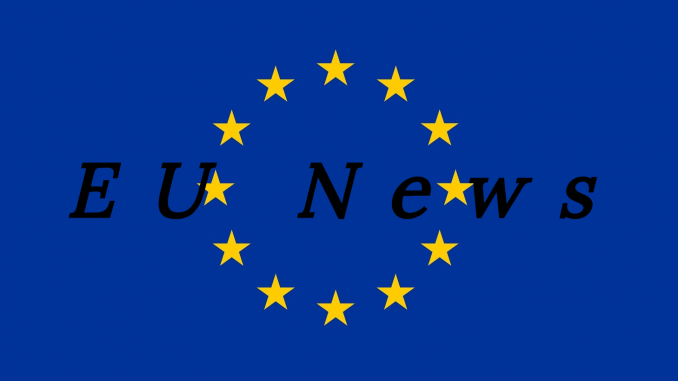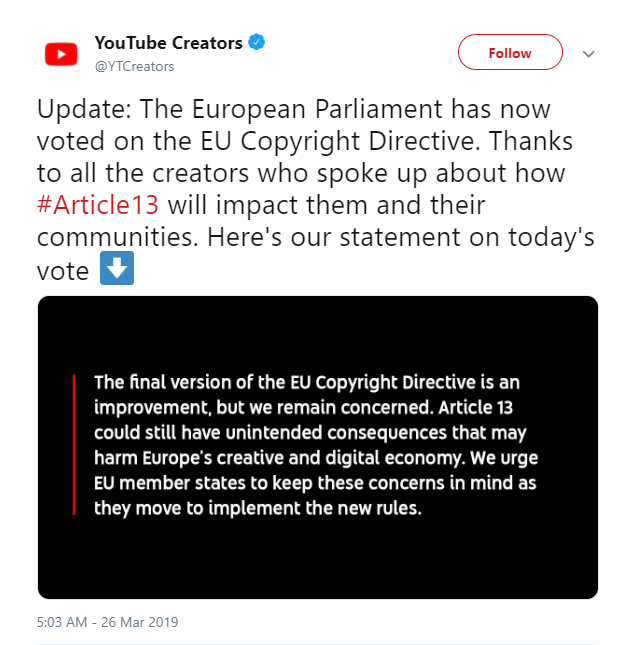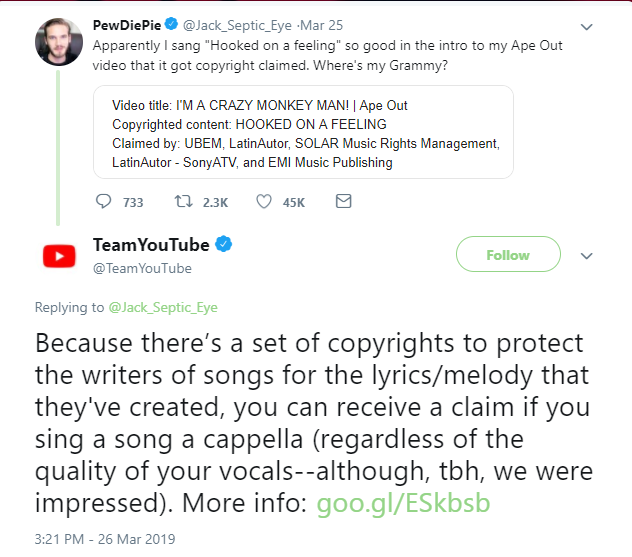
Contrary to what many people claim and believe, the European Union’s Article 11 and Article 13 of the updated Copyright Directive have not yet been fully approved.
Artículo disponible en Español | Article disponible en Français
Over these past few days, since the European Parliament approved the EU’s updated Copyright Directive, a lot of drama has been going on, fuelled by people completely clueless about the whole subject. These clueless people throw around claims that the internet is now dead, that European Parliament members only wanted to ban “memes” and how they are now using a VPN to access YouTube and other sites.
All this paranoia is actually understandable, seeing the large amount of noise made by a small amount of people, these being some European Parliament members and big tech companies such as Google, forming part of the well-known “GAFA” group (Google, Amazon, Facebook, Apple). Ironically, YouTube claimed, until recently, that, if Article 13 was passed, YouTube would be inaccessible in the EU. The company was so ambiguous in its claims that the public understood that, right after the European Parliament approved the Directive, YouTube would stop being accessible in the European Union. Well, is YouTube still accessible? Yes. Nothing has changed. Curious. YouTube posted this message recently, further deceiving its clueless users:
Update: The European Parliament has now voted on the EU Copyright Directive. Thanks to all the creators who spoke up about how #Article13 will impact them and their communities. Here’s our statement on today’s vote ⬇️ pic.twitter.com/ETHEOYwr7w
— YouTube Creators (@YTCreators) March 26, 2019
Most of the public took the bait and decided to campaign for the rights of billion-dollar, foreign companies, not bothering to double-check the legislative process of the European Union. The European Commission drafts propositions, which can occasionally come from the European Parliament or even the public, if the campaign manages to gather enough support. Once the draft for a Directive is finished, this one will go through the European Parliament, and be either accepted or rejected in a vote. If the directive is rejected, the European Commission can still make changes and submit it again, until it eventually passes. Finally, once the European Parliament approves a directive, this one will go through the European Council for a last vote. If approved, member-states have up to two years to adapt the Directive into their legislation, turning it into law. It is only at this point that both companies and the public is liable/affected by a Directive. Until then, companies and the public have time to adapt their business model and user conditions to conform with the new rules, just as with what happened when the EU General Data Protection Regulation (GDPR for short) started being enforced.
In this case, the European Parliament approved a revised version of the Copyright Directive, which this time includes direct protections for “memes”, criticism, review, caricature, parody and others. This specific point is not free to adapt by member-states, contrary to the past where the right to review and caricatures were not necessarily protected in all EU countries. On top of this, Article 11 and Article 13, the most controversial ones, have changed, with Article 11 being now Article 15 and Article 13 now being Article 17.
In other words, a Directive has no legal power, it remains a text for member-states to base their legislation on.
In an older version of the Directive, countries would have been free to adapt Article 13 (now 17) as they pleased, meaning the right to criticism, review, caricature, parody, sharing memes and others could have not been protected in the Union as a whole. In the new version, this is a must. This is not uncommon with directives, allowing countries to adapt them as they please, sometimes leaving entire sections out, ending up with large discrepancies between legislation of two different countries. With the Commission trying to make a more unified Union, this “laissez-faire” is slightly confusing. The Commission should instead force countries to apply the Directives entirely, without leaving out specific parts, and try to adapt it into national law as closely as possible, to have a similar/coherent legislation in all of EU-28 (now EU-27?).
Some of the most prominent figures of the campaign against the updated Copyright Directive and especially Article 17 have been organizations such as EFF, the Electronic Frontier Foundation, which is an American organization having no relationship whatsoever with Europe, and people like Julia Reda (also known as “Senficon” on Twitter), both of which pushed for a Change.org petition and a campaign called “SaveYourInternet”, campaign backed by none other than GAFA, with the names of Amazon, Facebook and Google quietly hidden behind.
This is not the first time that European debates and legislations are mined by foreign companies, with other directives such as GDPR facing similar issues, as this one limited the amount of data companies could gather behind the back of the user without this one knowing, limited how freely user data could be moved in and out of the European Union, and others.
At the end of the day, it is quite saddening to see how people will be deceived into believing the European Commission and European Parliament have nothing else to do than to ban “memes”. It is also quite saddening to see how organized and how far a message for such a cause can go, while other more important Directives will just be ignored by the public. An example of a more interesting conversation is how Europeans are now able to travel around the EU and still have access to the content they subscribed in their home country, with many services restricting access to said content when outside the home country in the past. It is also saddening to see how little European citizens themselves know about the legislative process of their own Union, believing every single word large American companies will say without bothering to do some simple research on their own side.
Taking in account the current social climate around the EU, with more and more people turning against the Union for simple reasons, large companies must remain neutral and help citizens understand their Union better, giving them all the material for citizens to make up their own mind, rather than telling them what to think and do. At this point, the entire “Save Your Internet” campaign and others can be considered a monumental farce, a joke, which could have been, instead, a perfect opportunity to teach a larger amount of people about the EU and its legal processes, as well as involving citizens in a proper reform of the copyright system.
At the end of the day, the only thing that will destroy YouTube is themselves and their own current copyright filters, allowing big corporations to copyright creators over nothing, as can be seen in the following example:
Because there’s a set of copyrights to protect the writers of songs for the lyrics/melody that they’ve created, you can receive a claim if you sing a song a cappella (regardless of the quality of your vocals–although, tbh, we were impressed). More info: https://t.co/zZDgHswl5Y
— TeamYouTube (@TeamYouTube) March 26, 2019
Following YouTube’s own logic, one can copyright claim an entire video out of a few seconds of just mentioning the lyrics of a song, but the real problem here is not YouTube’s own system but Article 17.
In any case, the European Council should be voting on the approval or refusal or the updated Copyright Directive in a few days, with high chances of passing it. Once passed, companies will have two years to prepare, meaning until 2021. Predicting in advance its effects is very difficult, with large companies more worried about protecting their bottom-line than thinking how to apply it effectively.
More on this subject:




